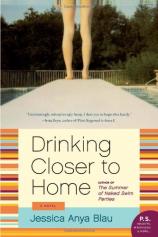Reading Group Guide
Discussion Questions
Drinking Closer to Home

1. In Drinking Closer to Home there are many ways in which the characters’ childhood relationships with one another continue on into adulthood. Where are the moments in which the characters act distinctly different as adults than they did as children? What does this say about their adult relationships? What does this say about each of them as an adult?
2. What are the different parent-child dynamics in this novel and how do those dynamics affect how the family functions as a whole? Do the early parent-child dynamics influence how the grown children interact with the parents? Do those early dynamics influence Louise and Buzzy as they interact with Anna, Portia and Emery?
3. Women played a very different role in society and in family life in the 1970s than they do today. What were some of the implications of a woman quitting her housewife duties in the early 1970s? What might the implications be now?
4. How does the novel address the psychology of children who are neglected? How do young Portia, Anna and Emery cope with their odd sense of freedom? How do they understand the past when looking back?
5. Anna longs for cleanliness and is repulsed by the filthy state of her childhood home. Portia does not seem to mind. How does the state of their home reflect the state of the family? Do our attitudes toward cleanliness (physical, mental, or spiritual) reveal things about ourselves?
6. All of the characters in Drinking Closer to Home have vastly different understandings of adultery; of its significance and how it affects the people involved. What are these different understandings? How do they conflict with one another?
7. Anna, Portia and Emery are adults, but to Louise and Buzzy they are considered “the children.” What are the difficulties and intricacies associated with the characters’ experience of being adults and children at the same time?
8. As children, Anna, Portia and Emery constantly question and even fear their parents’ odd behavior. What are the fears and insecurities that they let go of as adults? What are the worries they continue to hold onto?
9. What does sex mean for the different characters of the novel? What does it offer the characters? What does it take from them? What does it stand for?
10. How do the main characters of this novel understand love and affection? Where in the novel are their romantic attitudes a direct influence of their parents? Where are their romantic attitudes a direct reaction against their parents? How do these attitudes change over the course of the novel?
11. In what ways can keeping secrets be a good thing? A bad thing?
12. What are some ways in which this bizarre family might actually represent a very typical family? How does this family overlap with your family?
Drinking Closer to Home
- Publication Date: January 18, 2011
- Paperback: 337 pages
- Publisher: Harper Perennial
- ISBN-10: 0061984027
- ISBN-13: 9780061984020







